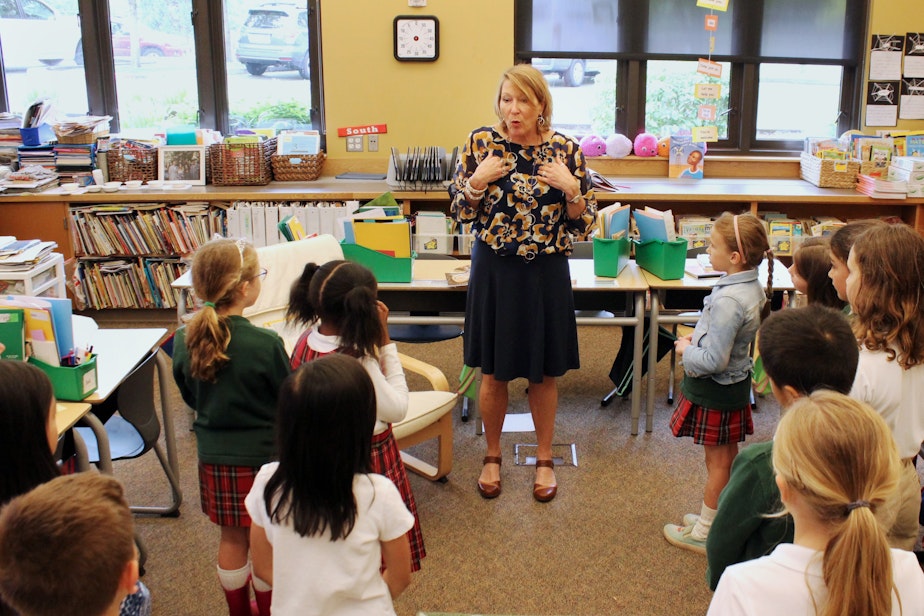How to raise a chill kid? Let them play

In our series, Wired for Worry, we've been examining how anxiety can become a problem for kids and parents.
When you are raising kids, how do you lower stress and anxiety in the hopes of preventing anxiety disorders from arising in the first place?
Everyone talks about rising anxiety, about our kids are more anxious than ever. What’s going on? We turned to our reporter Deborah Wang, who has been examining this issue.
Deb Wang: Anxiety has always been the biggest mental health problem in this country. But I think we all have the sense that anxiety is on the rise and is more of a problem today than in the past.
There have been a lot of surveys where people report feeling more anxiety
We know that psychiatrists and psychologists have long waiting lists of people seeking help.
Sponsored
Part of that could be that people are more aware of mental health issues and are seeking help, and that’s a good thing.
But it also could be that there really is more anxiety out there today.
Bill Radke: There is a lot to be anxious about today, than when we were kids. Our parents basically ignored us and had faith in the idea that we would grow up fine. That’s not how we parent today.
Deb Wang: It’s not at all. We put so many expectations on our kids, even those of us who don’t consider ourselves helicopter parents or tiger moms.
Dr. Tammy Fisher, the school counselor at St. Thomas School, an independent school in Medina, says it’s an anxious time, that the world is becoming more competitive, that the future is more uncertain, and that’s making kids and parents anxious.
Sponsored
Fisher told me: “We as parents are feeling a lot of pressure to make sure we're giving our kids every opportunity to be successful providing them multiple exposures to all these things that are out there and you know Joey's in soccer but he's also playing piano and then he's also taking Mandarin and then he also might be you know taekwondo or Kumon.
"There's a lot of pressure the parents are feeling to make sure they're providing these opportunities for their kids.”
Dr. Laura Kastner, a clinical psychologist who has written five books on parenting, told me that at the beginning of her career, she never heard a kid in elementary school talk about college.
“I hear about it all the time now,” she said. “That's culture.”
Bill Radke: So these experts are saying that parents are responsible for making their kids anxious?
Sponsored
Deb Wang: Yes, and no.
First of all, experts say anxiety has a genetic basis—so some people are wired for anxiety—sensitive, quick to react. I come from a long line of anxious people — which might have been a really positive trait to have back when we were cave people, when hyper vigilance would have been really helpful in staying alive.
But fast forward to today … then you add to the mix high expectations of parents, social media, the state of the world, economic worries … it’s a complicated mix.
Bill Radke: If anxiety is really complicated, what can parents do if anything to minimize the risk of anxiety becoming a problem for their kids?
Deb Wang: One of Laura Kastner’s books is called “Getting to Calm.” She is all about parents staying calm in this anxious world, being an anchor for their kids.
Sponsored
She said, “You get what we call circular anxiety,” she said.
“I'm stressed and reporting it. Then Mom gets stressed and wants to respond to it. Then I get more stressed because the brain is an open Wi-Fi system, and I'm picking up on your emotions; you're picking up on my emotions, and they can ramp up in an exponential way.
"We all need to say recognize that emotions are contagious. And then the adults especially want to learn how to respond to that in a way that it doesn't accentuate it because we're stressed that they're stressed right.”
Bill Radke: Laura Kastner’s solution sounds simple. She says it’s a question of dialing back expectations.
Deb Wang: She tells parents, hey make sure your kids gets enough sleep. Like eight hours a night or more. And she says people get this stricken looks on their faces, and they say, well but what if my kid has homework, and they have got to keep up their grades, and blah blah blah.
And she says, well then they learn consequences, and maybe their grade goes down, but all the science says that sleep is really important for physical and mental health. And she says some parents just refuse to accept that because they think school and grades come first.
Sponsored
So her alternative way of raising kids? Dial down to the expectations. Let them be kids.
“I just sit at the altar of play, just hanging out,” she said. “No education involved, just hanging out, because play is how the brain gets wired and creative and smart.”




